|
|
|
Sort Order |
|
|
|
Items / Page
|
|
|
|
|
|
|
| Srl | Item |
| 1 |
ID:
173750
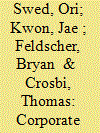

|
|
|
|
|
| Summary/Abstract |
From an obscure sector synonymous with mercenaryism, the private military and security industry has grown to become a significant complementing instrument in military operations. This rise has brought with it a considerable attention. Researchers have examined the role of private military and security companies in international relations as well as the history of these companies, and, above all, the legal implications of their use in the place of military organizations. As research progresses, a significant gap has become clear. Only a handful of studies have addressed the complex of issues associated with contractors’ demographics and lived experience. This article sheds some light over this lacuna, examining contractors’ demographics using descriptive statistics from an original data set of American and British contractors who died in Iraq between the years 2003 and 2016. The article augments our understanding of an important population of post-Fordist-contracted workforce, those peripheral workers supplementing military activity in high-risk occupations with uncertain long-term outcomes.
|
|
|
|
|
|
|
|
|
|
|
|
|
|
|
|
| 2 |
ID:
173753
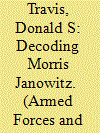

|
|
|
|
|
| Summary/Abstract |
The American sociologist Morris Janowitz presented two world views of security named “absolutist” and “pragmatist.” This dualistic paradigm endures into the 21st century and explains how complex and contentious security options are debated within the U.S. security establishment. His paradigm also reveals a condition called the “hegemon trap,” which means that the more powerful militarily that a state becomes relative to other states, the less likely it will fight a large-scale conventional war, resulting in frequent and perpetual limited, low-intensity, and unconventional wars. Based on experiences learned since the Vietnam War, the United States can improve global security by balancing resources between absolutist and pragmatist outlooks. This requires devoting a greater share of resources toward peacetime engagement, stability operations, and unconventional warfare.
|
|
|
|
|
|
|
|
|
|
|
|
|
|
|
|
| 3 |
ID:
173755
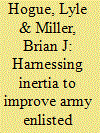

|
|
|
|
|
| Summary/Abstract |
Army recruiting, initial entry training, and retention enterprises consume tremendous manpower resources and become disproportionately more expensive and challenging as the size of the Army increases. Fortunately, empirical evidence suggests that the Army could readily improve enlisted continuation rates by changing enlistment contracts from its present form, requiring soldiers to reenlist or opt-in to continue service, to open-ended enlistment contracts that require soldiers to opt-out of service upon fulfilling their service obligations. Changing enlistment contracts to an opt-out paradigm—similar to how officer populations are currently managed—could greatly increase the number of soldiers who continue service past their initial enlistment obligation. Improved continuation rates could save the Army hundreds of millions in recruiting and reenlistment incentives, as well as freeing thousands of Non-Commissioned Officers serving as recruiters, drill sergeants, and retention specialist to support other operational requirements.
|
|
|
|
|
|
|
|
|
|
|
|
|
|
|
|
| 4 |
ID:
173751


|
|
|
|
|
| Summary/Abstract |
Building upon the conceptual work of Krahmann and Habermas, this study explains how political power and market forces in China combined to create an enormous domestic market for overseas security services and, at the same time, undermined the full development of domestic private security companies (PSCs). The growing responsiveness of the state to the request for protection of Chinese citizens and assets abroad made room for the initial development of Chinese PSCs’ overseas operations. However, the policy makers’ focus on political loyalty has inhibited the full-fledged maturation of China’s private security industry. So far, large foreign PSCs have been the main beneficiaries of this situation. The future development of Chinese PSCs remains possible in a gradual and pragmatic way, but Chinese policy makers will have to deal with important diplomatic and political questions before the development of any “Chinese Blackwater” will be imaginable.
|
|
|
|
|
|
|
|
|
|
|
|
|
|
|
|
| 5 |
ID:
173754
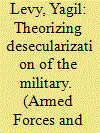

|
|
|
|
|
| Summary/Abstract |
This article addresses scholarly deficiencies in identifying the conditions under which the desecularization of militaries takes place. To theorize this process, two militaries are studied, the United States and Israel. Arguably, six drivers sequentially generate the desecularization of the militaries: (1) Militaries largely mirror the growing influence of religion in the broader society. However, intramilitary drivers play their role in promoting/mitigating the extra-military mechanisms of desecularization. Thus, (2) organizational interests along with external constraints drive militaries to promote religious diversity, which may (3) lead to the empowerment of religious actors, and thereby to further desecularization through religious intolerance, and to (4) reliance on the spiritual and religious services provided by military chaplains, and jointly stimulate (5) the use of religion to motivate military sacrifice. By religiously increasing the symbolic value of military sacrifice, (6) religiosity becomes more naturally associated with good soldiering, thereby reshaping intramilitary hierarchies and, hence, further triggering desecularization.
|
|
|
|
|
|
|
|
|
|
|
|
|
|
|
|
| 6 |
ID:
173757


|
|
|
|
|
| Summary/Abstract |
This article explores models of identity at the U.S. Air Force Academy. Drawing on qualitative data gathered through a number of focus groups with cadets, it finds that despite technological changes that have revolutionized the battle space and policy efforts to shift the cultural identity of the forces, ideal identities remain infused with concepts that value the classical model of the heroic masculine. It suggests that functionally, this highly prized “warrior” ethos is becoming less relevant but could have the effect of undermining efforts to “diversify” the Academy. In the absence of a fundamental reconsideration of what constitutes the “ideal” air force officer, efforts to alter the demography and exclusionary culture at the Academy will be stymied.
|
|
|
|
|
|
|
|
|
|
|
|
|
|
|
|
| 7 |
ID:
173756
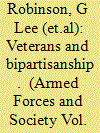

|
|
|
|
|
| Summary/Abstract |
Scholars and media outlets that cover the U.S. Congress devote substantial attention to the rise in partisanship and polarization over the past few decades. The steady increases in partisanship and polarization coincide with a comparable decline in veteran representation in Congress. While there are many factors that influence a congressperson’s behavior, an understudied issue is whether these trends suggest that veterans are more likely to exhibit bipartisanship than their nonveteran colleagues. Using two different measures of bipartisanship, this article draws on data from 12 different Congresses to examine whether veterans are more likely to be bipartisan than nonveterans. Utilizing difference in means tests, the results provide only modest evidence that increasing veteran representation would lead to more bipartisanship when controlling for generational differences. This article suggests a research agenda to further assess these findings and discusses the implications of increasing veteran presence in Congress on civil–military relations.
|
|
|
|
|
|
|
|
|
|
|
|
|
|
|
|
| 8 |
ID:
173752


|
|
|
|
|
| Summary/Abstract |
Cross-national research contends that women’s military participation has been associated with military function and organization, social structure, culture, and political factors. This exploratory study of Jordanian women suggests that these factors and their subcategories simultaneously help and hinder them. Using Segal’s updated model for women’s participation in the military, we explore how the meaning of Jordanian military women’s experiences compare in a cross-national theoretical framework. We review Segal’s updated model variables and compare it to interview data based on a grounded theory approach. Using semistructured interviews with a nonrandom sample of women who served in the Jordanian military or police, we place their experiences in a cross-national context and provide exploratory qualitative analysis of how these women navigated social and cultural norms. Our results showed that participants perceived their positive experiences and ability to achieve aspirations as enablers to their success, which they considered unlikely in the civilian workforce.
|
|
|
|
|
|
|
|
|
|
|
|
|
|
|
|
|
|
|
|
|